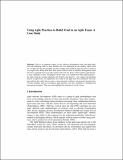| dc.contributor.author | McHugh, Orla | en |
| dc.contributor.author | Conboy, Kieran | en |
| dc.contributor.author | Lang, Michael | en |
| dc.date.accessioned | 2010-07-07T16:45:39Z | en |
| dc.date.available | 2010-07-07T16:45:39Z | en |
| dc.date.issued | 2010 | en |
| dc.identifier.uri | http://hdl.handle.net/10379/1177 | en |
| dc.description.abstract | Trust is an important aspect of any software development team, but particularly with self-managing teams as team members are very dependent on one another. Agile teams are considered to be self-managing and they employ many different agile practices to function as an agile team. While there have been many studies of trust in software development teams few have examined trust in an agile context with even less focus on how specific agile practices may contribute to trust. The purpose of this study is to examine how three agile practices - the daily stand-up, iteration planning and iteration retrospective - may support and facilitate trust in an agile team. An exploratory case study of one agile team was conducted. The findings indicate that while factors such as environmental conditions and personal characteristics of team members must be considered, agile practices can also contribute to building trust among team members. They may also highlight the existence of a lack of trust. | en |
| dc.format | application/pdf | en |
| dc.language.iso | en | en |
| dc.rights | Attribution-NonCommercial-NoDerivs 3.0 Ireland | |
| dc.rights.uri | https://creativecommons.org/licenses/by-nc-nd/3.0/ie/ | |
| dc.subject | Business information systems | en |
| dc.title | Using Agile Practices to Build Trust in an Agile Team: A Case Study. | en |
| dc.type | Conference Paper | en |
| dc.description.peer-reviewed | peer-reviewed | en |
| nui.item.downloads | 1175 | |


